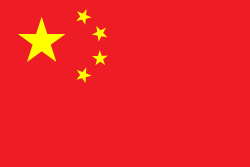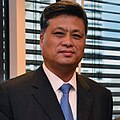| Governor of the Guangdong Provincial People's Government | |
|---|---|
| 广东省人民政府省长 | |
 | |
 | |
since 11 October 2025 | |
| Guangdong Provincial People's Government | |
| Type | Governor |
| Status | Provincial and ministerial-level official |
| Reports to | Guangdong Provincial People's Congress and its Standing Committee |
| Nominator | Presidium of the Guangdong Provincial People's Congress |
| Appointer | Guangdong Provincial People's Congress |
| Term length | Five years, renewable |
| Inaugural holder | Ye Jianying |
| Formation | 6 November 1949 |
| Deputy | Deputy Governors Secretary-General |
The governor of Guangdong, officially the Governor of the Guangdong Provincial People's Government, is the head of Guangdong Province and leader of the Guangdong Provincial People's Government.
Contents
The governor is elected by the Guangdong Provincial People's Congress, and responsible to it and its Standing Committee. The governor is a provincial level official and is responsible for the overall decision-making of the provincial government. The governor is assisted by an executive vice governor as well as several vice governors. The governor generally serves as the deputy secretary of the Guangdong Provincial Committee of the Chinese Communist Party and as a member of the CCP Central Committee. The governor is the second highest-ranking official in the province after the secretary of the CCP Guangdong Committee. [1] The current governor is Wang Weizhong, who took office on 27 December 2021.











































